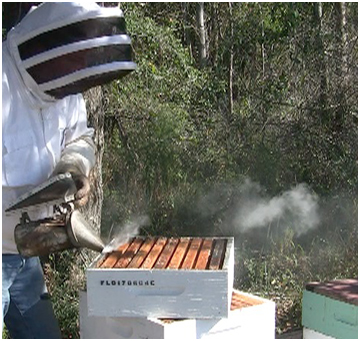
North Walton farmer produces wide variety of sweet honey
As a beekeeper only in his fourth year of operation, Jim Dietrich sure knows his bees. Picking up from what was a once a hobby with his father years ago, the DeFuniak Springs beekeeper now operates several bee apiaries full-time in locations throughout Walton County. The majority of the apiaries are located north of DeFuniak Springs in Glendale, with a few in South Walton.
Producing a variety of honey throughout most of the year, Dietrich’s Honey Farm supplies the local community with Tupelo in spring, gallberry, cotton and wildflower honey during the summer and fall months. Their honey can be found at Red Bay Grocery, Fannin’s Restaurant, Bruce Café and City Produce in Ft. Walton Beach.
The business of making honey is not an easy process. A typical bee will only produce 1/12 of one teaspoon of honey during its lifespan. Each bee colony hosts 30,000 – 35,000 bees at any given time with 95 percent worker females, 5 percent drones and one queen. The queen may breed with up to 20 drones and continually lays eggs. The typical lifespan of a worker or drone bee is typically 30-45 days, with the queen living several years.
If the queen dies, action must be taken immediately to keep a super (hive box) going. If the hive does not create a new queen, a beekeeper must acquire a new one or combine supers.
The bees produce the tasty honey nectar by creating wax cells on the frames. When full, the frames are removed from the super and brought to the farm for extraction of the honey. To keep the bees calm during removal of the frames, Dietrich uses a smoker.

Once back at the farm’s facility, the frames are put into a large stainless steel sink where the honeycombs are uncapped, then placed into an extractor. As extractor spins, and the centrifugal force removes the honey from the frames. The honey drains down the sides of the steel drum, out a spigot and into a filtered bucket. The bucket rests for a day or two while the excess wax and air bubbles rise to the top. The tasty liquid gold is then ready for bottling.
The costs of running the operation is not cheap, as beekeepers must pay for annual inspections by various government agencies that check for CCD (colony collapse disorder) and sanitary condition of plants. The beekeeper must also pay for a county permit. In addition, there are a variety of natural cost factors to deal with such as beetles, too much moisture and diet supplements.
“It’s not as simple as it use to be,” Dietrich explained.
Seventeen million pounds of honey are produced in Florida each year and enjoyed around the world as the sweetener of choice.
For more information about Dietrich’s Honey Farm or to purchase honey you may contact them at (850) 259-3447 or order on line at: www.dietrichshoneyfarm.com

Priscilla
October 19, 2010I have had this particular honey and it is delicious, just ran out so will get another jar this week!
Jason
October 20, 2010Dietrich’s Honey can also be picked up at Sarge’s Cellular Repair in Valparaiso, FL. It’s not just good honey – it’s good honey made by a true master of the science. If you have alergies, this is one of the best remedies out there! Jimmy saved me from months of sniffling and headaches 🙂 GET SOME OF THIS HONEY!!!
Ruth Johnson
December 13, 2010Do you deliver honey in the Vernon, Fla., Chipley, Florida, Greenhead, Florida, or Panama City, Fla. area. I need to buy a half gallon, have a friend in Lynn Haven that needs two half gallons. Can you help us. Thanks. Ruth Johnson
Walton Outdoors
December 13, 2010For more information about Dietrichs Honey Farms or to purchase honey you may contact them at (850) 259-3447.
Jenny Burgess
November 19, 2011I bought some of your wildflower honey at the NUMC Bazaar in Niceville and it is delicious and I would like to purchase more. I guess Sarge’s in Valparaiso is the closest place I can purchase it. Is that correct?
Thanks,
Jenny Burgess